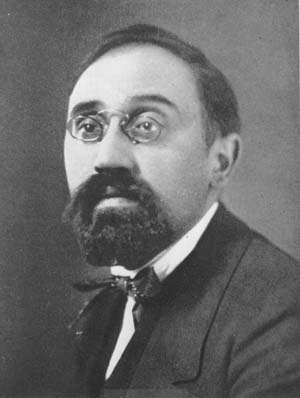Ob. Bahnrat i.R. Ing. Robert Stricker

Personalia
Born:
Died:
Profession:
Persecution:
Imprisonment 14.03.1938 - 02.04.1938,
Dachau concentration camp 02.04.1938 - 23.09.1938,
Buchenwald concentration camp 23.09.1938 - 14.02.1939,
Theresienstadt ghetto 24.09.1942 - 28.10.1944,
Murdered in Auschwitz concentration camp after 28.10.1944
KZ Number:
Memberships
Curriculum Vitae
Robert Stricker was born to the Jewish middle-class family of Israel and Florentina Stricker in Brno [now Brno in the Czech Republic] in Austro-Hungarian Bohemia. He attended elementary school there and, after completing lower secondary school, went on to upper secondary school and mechanical engineering school. He then studied at the Technical University in Brno.
While still at school, he became interested in the ideas of Theodor Herzl and became involved in Zionist groups. In 1896, for example, he co-founded the Zionist student fraternity Veritas in Brno and served as its senior; two years later, he founded the student fraternity Emunah, the first Jewish trade association in the Austrian monarchy. He advocated a radical Zionism that favored emigration to Israel rather than assimilation in Austria-Hungary.
In 1902, he graduated from technical college and entered the service of the Imperial and Royal State Railways in Olomouc. State Railways in Olmütz [today: Olomouc in the Czech Republic], from where he was transferred to the management of the Kaiser-Ferdinand-Nordbahn in Vienna in 1905.
In Vienna, a center of the Zionist movement in Europe, Robert Stricker subsequently developed into one of the most influential Jewish national-Zionist politicians. Together with Jakob Ehrlich, he was elected to the board of the Jewish Community in 1912, and in 1913 he was elected to the Grand Action Committee, the executive body of the congress, at the XI World Zionist Congress held in Vienna.
But Robert Stricker also championed his ideals as a journalist: Editor of the Jüdische Zeitung since 1907, he founded the Jewish War Archive alongside Nathan Birnbaum in 1915, which, with its journal Jüdisches Archiv, documented the achievements of Jewish soldiers in the First World War as well as the suffering of the Jewish civilian population in the war zones of Galicia and Bukovina. After the end of the war, he developed a lively publishing activity committed to the Zionist idea with writings such as The Representatives of the Jewish People, Jewish Nationalism and How Can We Keep Our Youth Jewish.
In the 1919 elections to the Constituent National Assembly, he was able to win a mandate for the Jewish National Party. As a member of parliament, he spoke out against the annexation of German-Austria to Germany and called for a referendum. In the National Council elections the following year, he did not succeed in re-entering parliament due to a change in electoral law, despite gaining more votes. In 1919, he married the widow Paulina (Paula) Kohn, adopted her son Wilhelm and had a daughter with Paula, Judith.
From 1919, Stricker was also co-publisher and editor-in-chief of the Wiener Morgenzeitung, the only German-language Jewish daily newspaper in Europe, which also served as a mouthpiece for the Jewish National Party. In terms of content, the paper proactively championed the political, social and economic rights of Jews at home and abroad and took a firm stance against anti-Semitic tendencies. The financial problems of the Wiener Morgenzeitung, which could not be overcome despite Robert Stricker's intensive efforts, led to him withdrawing from the newspaper in 1925. After its final closure in 1927, he edited the weekly review Das Neue Blatt
until March 1938. In 1936, Robert Stricker was elected Vice President of the Jewish Community of Vienna, was also a co-founder of the Jewish World Congress and headed its Austrian section until 1937.
In these roles, he also witnessed the demise of a free and independent Austria with the invasion of the German Wehrmacht. On March 14, 1938, Robert Sticker was arrested by members of the SS in his office of the newspaper Neue Welt in Universitätsstraße. He had refused to flee to Budapest the day before because he did not want to "abandon" the Jewish community. On March 18, 1938, the Jewish community of Vienna was searched by members of the SS, closed and the president Desider Friedmann, the second vice president Jakob Ehrlich, and the director of the IKG Josef Löwenherz as well as other Jewish functionaries were arrested in the course of the National Socialist persecution of Jews. In the course of the raid, donation receipts for the Vaterländische Front were found during a search of the IKG's premises. The campaign donations amounting to 800,000 schillings for an organization that advocated Austrian statehood were the official reason for the arrests.
After the receipt was found, Adolf Eichmann blackmailed the IKG into paying the same amount by deporting the members of the Presidium, including Robert Stricker, to the Dachau concentration camp
Places
Residence:
Persecution:
Death Place:
Citations
Dokumentationsarchiv des österreichischen Widerstands (DÖW)
Alpen Adria Universität unter litkult1920er.aau.at/litkult-lexikon/stricker-robert/
Wikipedia unter de.wikipedia.org/wiki/Robert_Stricker
